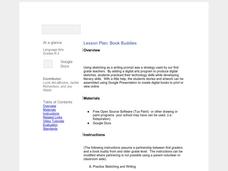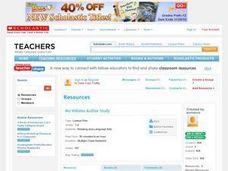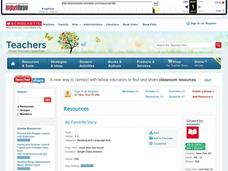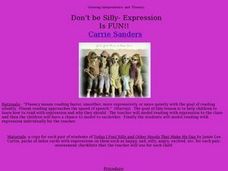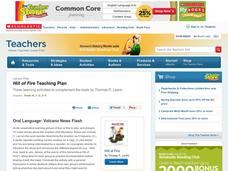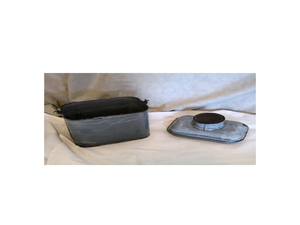Curated OER
My Ww Book
In these alphabet mini book worksheets, students study and review a plethora of words that begin with the letter "W." The books contains brightly colored pictures of some of the terms to engage the students in their studies.
Curated OER
Book Buddies
Students read a book and share a book review with an e-mail book buddy once a month. They word process the review, copy and paste into the e-mail for sharing.
Curated OER
Grade 2 Language Arts Review Quiz
In this language arts review worksheet, students complete 6 general review questions pertaining to alphabetical order, vowel sounds, analogies and proofreading and correcting errors.
Curated OER
Language Arts Review Quiz #2
In this language arts review worksheet, students complete 6 exercises: students find a pronoun, complete a sentence with a question word, put words in alphabetical order, circle words that rhyme, select the word with short 'i' sound, and...
Curated OER
Can We Switch Genders of Story Characters?
Students read and review the main elements of a story. In this language arts lesson, students predict what the story read to them would have been like if the genders of the characters had been different. Students write a new...
Curated OER
Newcomers
Explore emotions associated with moving to a new home with young learners. First they listen to the books Painted Words/Spoken Memories by Aliki and Going Home by Eve Bunting. Then they are invited to share their experiences as well as...
Curated OER
Theater: Create a Script
Figurative language is the focus in the book Teach Us, Amelia Bedelia. After reading Peggy Parish's book, class members dramatize idioms from the text, using dramatic strategies such as characterization, exaggeration, and...
Curated OER
Mo Willems Author Study
Who is Mo Willems? Explore the author with your class. Learners read books written by Willems, compare and contrast the characters therein, and make predictions about what will happen. Finish off this author study by having small groups...
Curated OER
My Favorite Story
Learners discuss their favorite book. In this book discussion instructional activity, students name the title and tell what makes the book special. Learners also review the setting, plot, conflict, and resolution. Students make a book...
Curated OER
Reintroduce: Main Idea
What would a main idea be without important details? Readers use a graphic organizer to record key details from an informational text (a fiction text would also work). Review main idea as a concept before beginning, asking scholars...
ESL Kid Stuff
Toys
The world is a rainbow of colors in a set of lessons for English learners. Kids review colors with matching games and hide-and-seek, before singing songs about colors and reading a class story.
Curated OER
Don't Be Silly–Expression is Fun!
As children observe the teacher reading Today I Feel Silly and Other Moods That Make My Day, they take note of the role punctuation plays in the emotion or expression used. They then take turns reading a book with a partner so they can...
Curated OER
Build Mastery: Sequencing
Writing a summary is much easier once you've laid out the sequence of events. Show readers how these two skills are intertwined using this graphic organizer. Review the meaning of sequencing first, presenting the chart and possibly...
Curated OER
A Season for Chapters
Art, music, poetry, and the beauty of the seasons is what you'll find in this very nice unit idea. You can use any of the suggested books and activities to engage your second graders in an exploration of the changes that take place...
Curated OER
Lewis and Clark and Me: A Dog's Tale
Providing a wonderful way to explore reading and vocabulary skills, this resource takes your class on a journey to understand the accomplishments of Lewis and Clark through the eyes of their dog Seaman. It focuses on using the book Lewis...
Roseburg Public Schools
Library Skills and Literature
The library is such a valuable resource for kids of all ages. Help elementary readers learn all about parts of the library, text features for both fiction and nonfiction text, and different ways to find books that they want to read.
Curated OER
Lesson Mystery: The Game is Afoot
Learners enter and experience the world of Sherlock Holmes and hard-boiled detectives in this unit on mysteries. They review and analyze the ""Whodunit Requirements" and the "Mystery Contract" that accompany this lesson. Each student...
Curated OER
Build Masters: Identifying Details
Find key details in books using this note card strategy. Each reader gets six cards with the classic who, what, where, when, why, and how detail prompts. After they read the book, they choose a card and locate a key detail...
Scholastic
Hill of Fire Teaching Plan
Some books are perfect for drawing connections between multiple subjects. The book Hill of Fire becomes the hub for three very different, yet related activity ideas. First the class hones their oral language skills by creating an...
Curated OER
Lilly's Purple Plastic Purse: Kevin Henkes
Kevin Henkes has composed a series of books in which Lilly the mouse is a main character. Third graders use illustrations and key details as they compare and contrast the books, Lilly's Purple Plastic Purse and another...
Curated OER
Lunch Pail
Explore a 1900s lunch pail. In this oral language and 1900s history lesson, students view a photograph of an old-fashioned lunch pail. Students describe the object and make predictions about what it is and its possible uses. Students...
Jessica Winston
The Biggest Valentine Ever
Combine hearts with minds in a reading comprehension activity with a Valentine's Day theme. Steven Kroll's The Biggest Valentine Ever, named one of the best books for kids in 2014, provides kids with an opportunity to practice their...
Curated OER
Giving Thanks for Food and Farms
Sarah Stewart’s The Gardener and Food from Farms by Nancy Dickmann display the importance of community farms. After reading these short picture books, class members draw connections between farms and the food we eat each day. As a...
Longman
Stories for reading comprehension
A packet full of old-fashioned short stories could be a review activity for a reading comprehension lesson. Learners read 14 stories before answering multiple-choice questions, fill-in-the-blank sentences, and vocabulary exercises.

